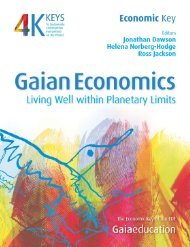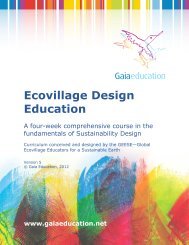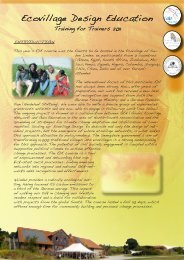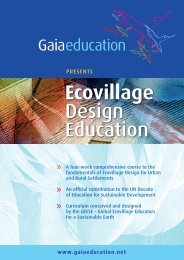Designing Ecological Habitats - Gaia Education
Designing Ecological Habitats - Gaia Education
Designing Ecological Habitats - Gaia Education
Create successful ePaper yourself
Turn your PDF publications into a flip-book with our unique Google optimized e-Paper software.
Damniyamgama eco-village : sustainable Development for tsunami restoration 205<br />
such as tree planting. Beyond the village itself, Damniyamgama plays an all<br />
important role in environmental education on a wider scale. In other words,<br />
the educational function extends far beyond the village. Nearby neighbourhoods<br />
become involved in programmes. Also, national and international<br />
visitors come to the village to learn about eco-concepts and to see how a<br />
good, well-designed ecovillage may function. Government officers and officers<br />
of other NGOs visit the project to gain knowledge about implementing the<br />
eco-concept to a resettlement scheme. Damniyamgama has become a pilot<br />
project and something of an experimental ground which will inform the<br />
development of future similar settlements. Without doubt, Damniyamgama<br />
may be regarded as a model village for demonstrating environmental sustainability,<br />
community-based development, and education to other development<br />
agencies and donors.<br />
Conclusion<br />
Out of tsunami destruction and despair, a ‘model’ of good practice in<br />
ecovillage sustainable development has been established by Sarvodaya.<br />
So far, it may be deemed a tremendous success – both from the point of view<br />
of the quality of life for the people who inhabit it and also because of its<br />
highly successful role in the education of residents and observers about living<br />
in an environmentally friendly and sustainable fashion. It is an excellent<br />
example of community-based environmental education that impacts upon<br />
people of all ages within the village and policy makers beyond it.<br />
Sajini Pathiraja was born in Sri Lanka in 1980. She completed her BSc. Degree in<br />
Agriculture at the University of Ruhuna in 2005. Shortly afterwards, she joined the<br />
Sarvodaya movement – the largest Non-Governmental Organization in Sri Lanka –<br />
doing community service work all over the country. As part of her work at Sarvodaya,<br />
she was given the responsibility of implementing the ecovillage development project for<br />
tsunami affected families. In 2007, she entered Durham University in the United Kingdom<br />
and completed a Master’s degree in <strong>Education</strong>. After that, she continued her work with<br />
Sarvodaya, specializing in community services with respect to implementing environmental<br />
conservation projects with community participation. She has practical experience with<br />
disaster management and community education as well.







